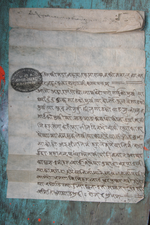An order from Jagat Śamśera to five mukhiyās of Aṭhāra Saya Kholā to pay an amount due (VS 1913)
ID: Tsum_0001_0008
Edited and
translated by Nadine Plachta and Rajendra Shakya
Created: 2017-05-13;
Last modified: 2024-02-21
For the metadata of the document, click here
The accompanying edition, translation/synopsis and/or commentary are available under the terms of the Creative Commons Attribution-ShareAlike 4.0 International License
Abstract
This document is a letter of Jagat Śamśera, who calls on the mukhiyās of Pācapārvā to settle an amount due, which had remained from a previous fine paid in Kerung, warning them that they will be dealt with by force if they continue to pursue fraudulent means to avoid making the payment.Diplomatic edition
[1r]
[Seal of Jagat Śamśera]1स्वस्तिश्रीमद्राजकुमारकुमारात्मजश्रीजनरलजगत्स2म्सेरजङ्गकुवरराणाजीकस्यपत्रम्===
3आगे∙अट्ठारसय़ेषोलामध्ये∙पारोगाऊकोमुषीया
4छ्यांडुंडुङाकगाउकोमुषीयादोर्ज्ये∙फुल्वेगाउको
5मुषीया∙फुन्जोनुर्वु∙छीलुगाउकोव़ाङ्जु∙नीलुन्
6गाऊकोमुषीया∙नाङ्माङ्केयथोचीत्∙उप्रांत्ती
7मिहरुसँग∙केरुंमालीनदिनभै∙वाकीरह्याकारु
8पैया∙मा∙तमसुक्लेषीयाकारुपैयालीआउनभ∙
9न्याकोहो∙अझसंमतिमीहरुलेरुपैयातिर्न∙नआ
10ऊदा∙महानन्दपाध्यास्मेत्∙सिपाहीजना२आया
11काछन्∙इनीहरुलाई∙रुपैयावुझाइ∙भरपाइली
12न्याकामगर∙रुपैयातिर्नामाझेलषेलगर्नापछी
13लाग्यौ∙भन्या∙तिमिहरुलाईधरपकर∙गरीरुपै
14या∙नछोडिल्याऊन्याछन्इतीसम्वत्१९१३सा
15लमितिआषाडशुदी२रोज६शुभम्¯¯¯==
Translation
[1r]
Hail! A letter from Prince General Jagat Śamśera Jaṅga Kũvara Rāṇā, the venerable prince born of a prince.
Āge: To the mukhiyā of Pāro GāũChyāṃ Ḍuṃḍu1 , mukhiyā of Ṅgāka GāũDorje, the mukhiyā of Phulve Gāũ2 Phunjo Norbu, Vāṅju [the mukhiyā] of Chīlu Gāu3 , [and] the mukhiyā of Nīlun Gāu4 , Nāṅmāṅ5 , [all] of Aṭhāra Saya Kholā.
Uprānta: [We] instructed you [earlier] to come and pay the money that remained [to be paid], as mentioned in the tamasuka after the transaction in Kerung. [Since] you have not yet come to pay the money, Mahānanda Pādhyā together with two security personnel (sipāhi) have come [bearing this letter to you in Pācapārvā]. Complete the task of handing over the money to them and get the receipt. If you attempt to pursue deceitful means in regard to paying the money, you will be arrested and brought here [to Kathmandu, and] not allowed to leave until you have paid the sum.
Friday, the 2nd of the bright fortnight of Āṣāḍha in the [Vikrama] era year 1913 (1856 CE). Auspiciousness.
Commentary
This is the third in a series of four documents issued about the same subject. We do not exactly know what sort of transaction took place in Kerung. However, documents (Tsum_0001_0006, Tsum_0001_0042) reveal that the headmen of the five sectors of upper Tsum were fined for helping the Tibetan army during the Nepal-Tibet War of 1855/56, and also for not handing a Tibetan deserter back over to the Tibetans. The penalty sum imposed differs in these two documents: Tsum_0001_0042 affirms the receipt of mohararupaiyā 365, while Tsum_0001_0006 puts the fined amount at mohararupaiyā 350. It therefore appears that the headmen had paid mohararupaiyā 15 more than they were fined. Both of these documents were issued on the same day. The document above was issued about five months after the two preceding writs. It is a follow-up call to pay the fine.

